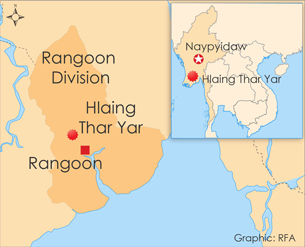Burma: Factory workers hold rare strike
| Publisher | Radio Free Asia |
| Publication Date | 6 February 2012 |
| Cite as | Radio Free Asia, Burma: Factory workers hold rare strike, 6 February 2012, available at: https://www.refworld.org/docid/4f3a25242.html [accessed 1 June 2023] |
| Disclaimer | This is not a UNHCR publication. UNHCR is not responsible for, nor does it necessarily endorse, its content. Any views expressed are solely those of the author or publisher and do not necessarily reflect those of UNHCR, the United Nations or its Member States. |
2012-02-06
Employees at a Burmese shoe factory demand salary for holiday closures.
 Factory workers held a rare strike at the Taiyi shoe factory in the Hlaing Thar Yar industrial zone. RFA
Factory workers held a rare strike at the Taiyi shoe factory in the Hlaing Thar Yar industrial zone. RFA
More than 2,000 factory workers held a rare strike in Burma Monday, demanding salary they said their employer withheld from them when the plant was closed during holidays in January.
Workers at the Taiyi shoe factory in the Hlaing Thar Yar industrial zone about 10 kilometers (six miles) outside of Rangoon staged a sit-in protest in front of the building early in the morning which lasted until 10:00 a.m.
Strike organizer Ko Than told RFA that factory owners had cut employees' wages for five official holidays in January, including Burma's Independence Day, when operations were shut down. They also deducted the wages when the plant, which is owned by ethnic Chinese, was shuttered for another five days during the Lunar New Year.
"From their January salary, more than 10,000 kyat (U.S. $10) was taken away, and therefore they are protesting to get it back," he said.
"About 2,300 workers participated in the strike."
One worker who asked to remain anonymous told RFA that participants ended the sit-in because no one from the company came to listen to their demands. But he said the strikers vowed to continue their actions Tuesday.
March strike
Strikes, which are exceptionally rare in heavy-handed Burma, have now occurred twice at the Taiyi shoe factory in less than a year.
Last March, more than 1,500 workers held a four-day strike demanding a number of labor rights and a salary increase.
Employees had been earning a mere U.S. $0.70 for a 12-hour work day and demanded an increase in wages to 75 kyat (U.S. $0.08) per hour.
Employees at Burmese factories generally earn an average monthly wage of U.S. $30-50 while their counterparts in Cambodia and Vietnamese earn at least U.S. $120 a month, according to Burmese exile magazine The Irrawaddy.
Burma's currency exchange rate system is currently undergoing a reevaluation as part of reforms initiated by the country's new nominally civilian government under President Thein Sein.
Officially, one U.S. dollar is exchanged for just six Burmese kyat. But in the widespread black market, the rate hovers around 750 kyat and has been as high in recent years as 1,250 kyat.
Reported by Moe Kyaw for RFA's Burmese service. Translated by Khin May Zaw. Written in English by Joshua Lipes.
Link to original story on RFA website
